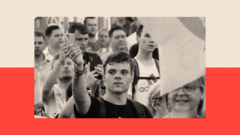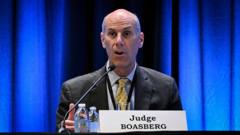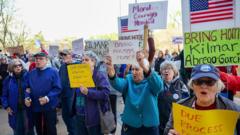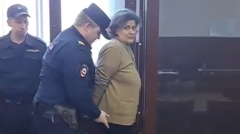As young German men gravitate towards far-right affiliations, notably the AfD, the interplay of anxiety over immigration, gender roles, and social media influence emerges as key driving factors. This article delves into the perspectives of youthful supporters, including their motivations for seeking radical political change and how historical narratives are being reshaped.
The Rising Tide: Young German Men Embrace Far-Right Ideologies

The Rising Tide: Young German Men Embrace Far-Right Ideologies
An exploration into the motivations behind the increasing attraction of the far-right Alternative für Deutschland (AfD) among young men in Germany, revealing social, economic, and cultural factors at play.
In the fog-laden streets of Freiberg, Saxony, a quiet sense of unease pervades among the youth, particularly young men drawn towards far-right ideologies. With the national election on the horizon, 19-year-old Nick articulates a desire for safety and stability, sentiments shared by many of his peers as they increasingly support Alternative für Deutschland (AfD), a party now polling second in Germany.
A key factor driving this shift is apprehension surrounding immigration, bolstered by high-profile incidents involving asylum seekers. Nick and his friend Dominic express resentment towards those exploiting the asylum system, mirroring sentiments prevalent among their demographic. Although they endorse certain forms of immigration, their criticisms target perceived abuses stemming from Germany's lenient policies.
Recent surveys indicate a marked rise in support for the AfD, particularly among young men, with Pew Research noting 26% of male respondents expressing favorable views towards the party, compared to just 11% among women. This aligns with exit polls from previous elections showing that those under 24 are increasingly turning to the AfD as their choice for representation.
Paradoxically, this demographic's anxiety correlates with political perspectives deemed orthodox, often feeling excluded from discourse that champions feminist or minority rights. As Dr. Rüdiger Maas from the Institute for Generational Research observes, issues like feminism resonate less with this millennial group, leading them down paths that reject mainstream liberal narratives.
Social media platforms like TikTok have emerged as critical battlegrounds, allowing the AfD to cultivate vibrant online communities. With an impressive following, the party leverages these platforms to reach young voters and reinforce simplistic narratives around immigration and national identity. Influencers, such as 25-year-old Celina Brychcy, share lifestyle content alongside political messaging, illustrating the blend of personality-driven engagement and political movements.
Responses to evolving gender norms also contribute to far-right attraction, with resistance against emerging ideologies around gender presentation. High levels of agreement with traditional views on male and female roles surface among potential AfD supporters, suggesting that fears around gender ideologies intertwine with the rightward shift.
As the specters of Germany's WWII past fade, a new generation emerges, one acclimatized to the normalization of far-right rhetoric, desensitized even to blatant instances of racism or extremism. Encounters with young men in places like Chemnitz unveil troubling endorsements of historical denial, heightening concerns around the political climate.
Support for the AfD transcends mere dissatisfaction with established political parties; many young supporters harbor genuine hope that the far-right could instigate substantial change in German governance. The political landscape may pivot as the AfD symbolically gains ground, challenging traditional coalitions and expectations for the future.
In this complex web of influences, rising far-right sentiments among young German men signify a potent shift in political consciousness, demanding urgent attention from scholars and politicians alike. The dynamics at play reflect broader European trends, with implications that could shape not only national politics in Germany but the collective future of Europe in an increasingly fragmented societal landscape.



















